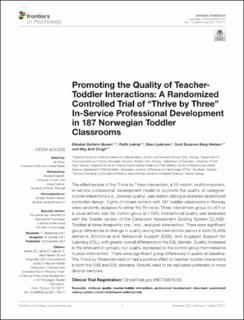| dc.contributor.author | Buøen, Elisabet Solheim | |
| dc.contributor.author | Lekhal, Ratib | |
| dc.contributor.author | Lydersen, Stian | |
| dc.contributor.author | Berg-Nielsen, Turid Suzanne | |
| dc.contributor.author | Drugli, May Britt | |
| dc.date.accessioned | 2022-02-14T14:03:31Z | |
| dc.date.available | 2022-02-14T14:03:31Z | |
| dc.date.created | 2021-12-13T09:57:32Z | |
| dc.date.issued | 2021 | |
| dc.identifier.citation | Frontiers in Psychology. 2021, 12 . | en_US |
| dc.identifier.issn | 1664-1078 | |
| dc.identifier.uri | https://hdl.handle.net/11250/2978868 | |
| dc.description | © 2021 Buøen, Lekhal, Lydersen, Berg-Nielsen and Drugli. This is an open-access article distributed under the terms of the Creative Commons Attribution License (CC BY). The use, distribution or reproduction in other forums is permitted, provided the original author(s) and the copyright owner(s) are credited and that the original publication in this journal is cited, in accordance with accepted academic practice. No use, distribution or reproduction is permitted which does not comply with these terms. | en_US |
| dc.description.abstract | The effectiveness of the Thrive by Three intervention, a 10-month, multicomponent, in-service professional development model to promote the quality of caregiver-toddler interactions (i.e., process quality), was tested utilizing a clustered randomized controlled design. Eighty childcare centers with 187 toddler classrooms in Norway were randomly assigned to either the Thrive by Three intervention group (n=87) or a usual-activity wait list control group (n=100). Interactional quality was assessed with the Toddler version of the Classroom Assessment Scoring System (CLASS-Toddler) at three timepoints: pre-, mid-, and post-intervention. There were significant group differences in change in quality during the intervention period in both CLASS domains, Emotional and Behavioral Support (EBS), and Engaged Support for Learning (ESL), with greater overall differences in the ESL domain. Quality increased in the intervention groups, but quality decreased in the control group from baseline to post-intervention. There were significant group differences in quality at baseline. The Thrive by Three intervention had a positive effect on teacher-toddler interactions in both the EBS and ESL domains. Results need to be replicated preferably in more diverse samples. | en_US |
| dc.language.iso | eng | en_US |
| dc.rights | Navngivelse 4.0 Internasjonal | * |
| dc.rights.uri | http://creativecommons.org/licenses/by/4.0/deed.no | * |
| dc.subject | childcare quality | en_US |
| dc.subject | teacher-toddler interactions | en_US |
| dc.subject | professional development | en_US |
| dc.subject | classroom assessment scoring system | en_US |
| dc.subject | cluster randomized controlled trial | en_US |
| dc.title | Promoting the Quality of Teacher-Toddler Interactions: A Randomized Controlled Trial of “Thrive by Three” In-Service Professional Development in 187 Norwegian Toddler Classrooms | en_US |
| dc.type | Peer reviewed | en_US |
| dc.type | Journal article | en_US |
| dc.description.version | publishedVersion | en_US |
| dc.subject.nsi | VDP::Samfunnsvitenskap: 200::Pedagogiske fag: 280 | en_US |
| dc.source.pagenumber | 12 | en_US |
| dc.source.volume | 12 | en_US |
| dc.source.journal | Frontiers in Psychology | en_US |
| dc.identifier.doi | 10.3389/fpsyg.2021.778777 | |
| dc.identifier.cristin | 1967606 | |
| dc.relation.project | Norges forskningsråd: 260624 | en_US |
| dc.source.articlenumber | 778777 | en_US |
| cristin.ispublished | true | |
| cristin.fulltext | original | |
| cristin.qualitycode | 1 | |

